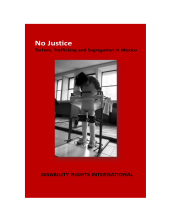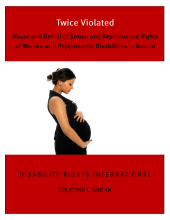Our work in Human Rights
Inside 'world's most dangerous' hospital in Guatemala
Video
An undercover BBC investigation into conditions at a mental health institution in Guatemala has revealed patient suffering and abuse at the hands of those meant to care for them. Federico Mora Hospital has been described by campaigners as the world's most abusive and dangerous mental health institution. In 2012, Guatemala was ordered by an American Human Rights Commission to make emergency improvements to the Federico Mora Hospital to "save lives". The government promised to comply. But an undercover BBC investigation found little has changed.
No Justice: Torture, trafficking and segregation in Mexico
Reports and Publications
Sin Justicia: Tortura, tráfico y segregación en México
Reports and Publications
Twice Violated
Reports and Publications
International Collaboration For Inclusion: A study funded by the United States Department of State
Reports and Publications
DRI helps Mexican activists fight human rights abuses
News Article
October 22nd, 2013 -- Washington, DC -- The New York Times today published an article profiling the Colectivo Chuhcan, Mexico's first human rights advocacy organization led by persons with psychiatric disabilities.
Orphanages are no place for children
News Article
Published in The Washington Post
An estimated 8 million to 10 million infants and children live in orphanages around the world, and aid agencies, churches and governments provide hundreds of millions of dollars in the hope that they can help vulnerable children find sanctuary in these institutions. This hope is badly misplaced. Orphanages are not safe places for children.



